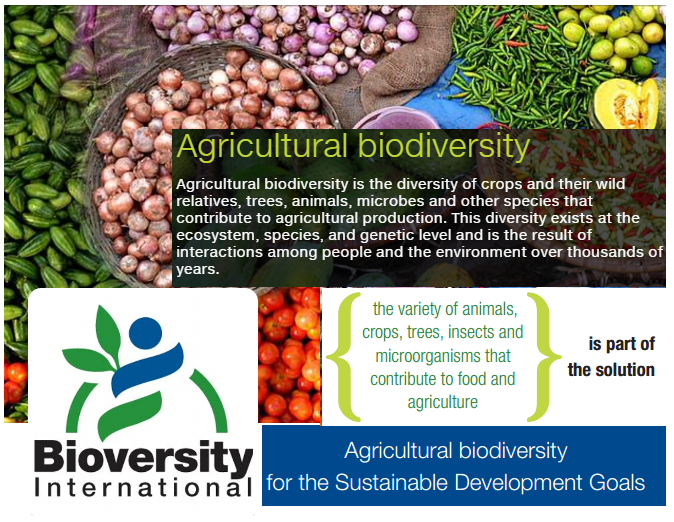Bioversity International: open research for development in agricultural and tree biodiversity


Bioversity International is a global research-for-development organization, whose mission is to deliver scientific evidence, management practices and policy options to use and safeguard agricultural and tree biodiversity to attain sustainable global food and nutrition security.
Did you know that?
Bioversity International
is the world agricultural biodiversity research-for-development centre (with Headquarters in Rome, Italy) that acts as a global resource on issues related to the effective deployment of agricultural and tree biodiversity in low-income countries in different regions such as Central and South America, West and Central Africa, East and Southern Africa, Central and South Asia and South-east Asia.
In June 2014, Bioversity International celebrated its 40th anniversary.
Partners of Bioversity International are: national agricultural research institutes and international research organizations, development and non-governmental organizations, government ministries, UN agencies and international bodies.
As a member of the CGIAR Consortium - a global research partnership addressing agricultural research for development and for a food-secure future (find out more in the 2016-2030 CGIAR Strategy and Results Framework) - Bioversity International contributes to the following ten of the CGIAR's cross-cutting global research programs:
Bioversity International’s objectives are:
CONSUME: to promote consumption of a diversified healthy diets from Sustainable Food Systems
PRODUCE: to help ensure biodiversity in resilient, productive and diversified farms, forests and landscapes
PLANT: to evidence the importance of seed systems delivering the high-quality, diverse planting material required by farm households and rural communities
SAFEGUARD: to help (through policies, global treaties and conventions) use and safeguard effective genetic resources and associated traditional knowledge for current and future needs.
(Read more about in Bioversity International's strategy).
Using and safeguarding agricultural and tree biodiversity delivers on multiple Sustainable Development Goals outlined by the United Nations:
GOAL 1: No poverty
GOAG 2: Zero hunger
GOAL 3: Good health and well-being (how agricultural biodiversity can contribute to health and nutrition)
GOAL 5: Gender equality
GOAL 12: Responsible Consumption and production;
GOAL 13: Climate action (how agricultural biodiversity gives farmers options to manage climate risks)
GOAL 15: Life on land (what role agricultural biodiversity plays in sustaining soil health, food and habitat for important pollinators and natural pest predators that are vital to agricultural production).
Bioversity International’s research and expertise, used in combination with novel technologies and approaches, have much to offer in addressing challenges to the achievement of sustainable development in the most vulnerable countries.
Bioversity International’s research-for-development portfolio
covers the following specialist areas:
The Bioversity International publication repository is part of the CGSpace repository.
The Bioversity International data repository is available as part of the Harvard Dataverse platform.
Browse the Bioversity International E-library for publications, databases, reports, and multimedia about agricultural biodiversity research.
Bioversity International and Open Access
The CGIAR Open Access and Data Management Policy was approved by the CGIAR Consortium Board in October 2013. This means that any research outputs published or developed by CGIAR centres – including Bioversity International - will be required to be open access from this date forward.
Contact either m.garruccio(at)cgiar.org or f.giampieri(at)cgiar.org to learn the various options open to you when you’re considering publishing a research paper.
Be considered for a general fellowship at Bioversity International
Bioversity International collaborates with students (MSc and PhD) and working professionals from developed and developing countries to carry out thesis or other research that contributes to its mission to deliver scientific evidence, management practices and policy options to use and safeguard agricultural biodiversity to attain global food and nutrition security. The topic of the research should be aligned with one of Bioversity International’s areas of expertise.
If you want to be considered for a general fellowship, please send your CV and a letter summarizing your suggested research topic to: Human Resources. Applications will be retained by the organization for a maximum of 12 months. Individually organized Fellowships typically need to source their own funds for research.
Be considered for an internship at Bioversity International
An internship at Bioversity Internationalis a great opportunity for talented students to acquire practical experience in their field of specialization while gaining a better understanding of the work of Bioversity International and CGIAR. Internships are normally offered for a maximum period of 12 months and include a modest stipend to cover essential expenses.
Find out more about eligibility criteria, terms and conditions.
Find out more:
Biodiversity International Infographic
Six facts about agricultural biodiversity
Bioversity International Newsletters
Bioversity International Media coverage, News ad @BioversityInt Tweets

